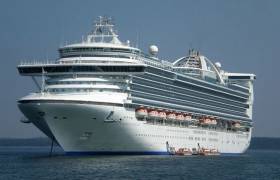Displaying items by tag: Inquiry Cruiseship's lost power
Inquiry As to Why Cruiseship Lost Power In Irish Sea
#Inquiry - An investigation has been initiated by Bermuda, writes Irish Times, into how a “mega-class” cruise ship with almost 4,500 people on board spent nine hours drifting without power in the Irish Sea
As reported on Afloat earlier this month, the 290-metre Caribbean Princess was forced to abandon a scheduled visit to Dublin Port after the serious incident occurred 25 miles southeast of the capital off the Wicklow coast on August 3rd.
The 17-deck ship eventually regained power that evening and made its way to Belfast port, where it berthed in the early hours of August 4th.
Bermuda, the British overseas territory which is the port of registry for the ship, said it had continuously monitored the vessel’s situation “from the time of its propulsion failure until the full propulsion power was restored and its voyage to Belfast completed”.
The Bermuda Administration said it had been in “constant communication” with the British Maritime and Coastguard Agency on the incident. Holyhead Coast Guard despatched a tug and helicopter to the ship, which had 3,306 passengers and 1,158 crew on board when it lost power on its route up the Irish Sea. The ship had been en route from Cobh to Dublin as part of a 12-day cruise from Southampton.
For more on the incident, the newspaper has more here. Afloat adds the cruiseship is today docked in Dublin Port, having called to Cobh, Cork Harbour.




























































